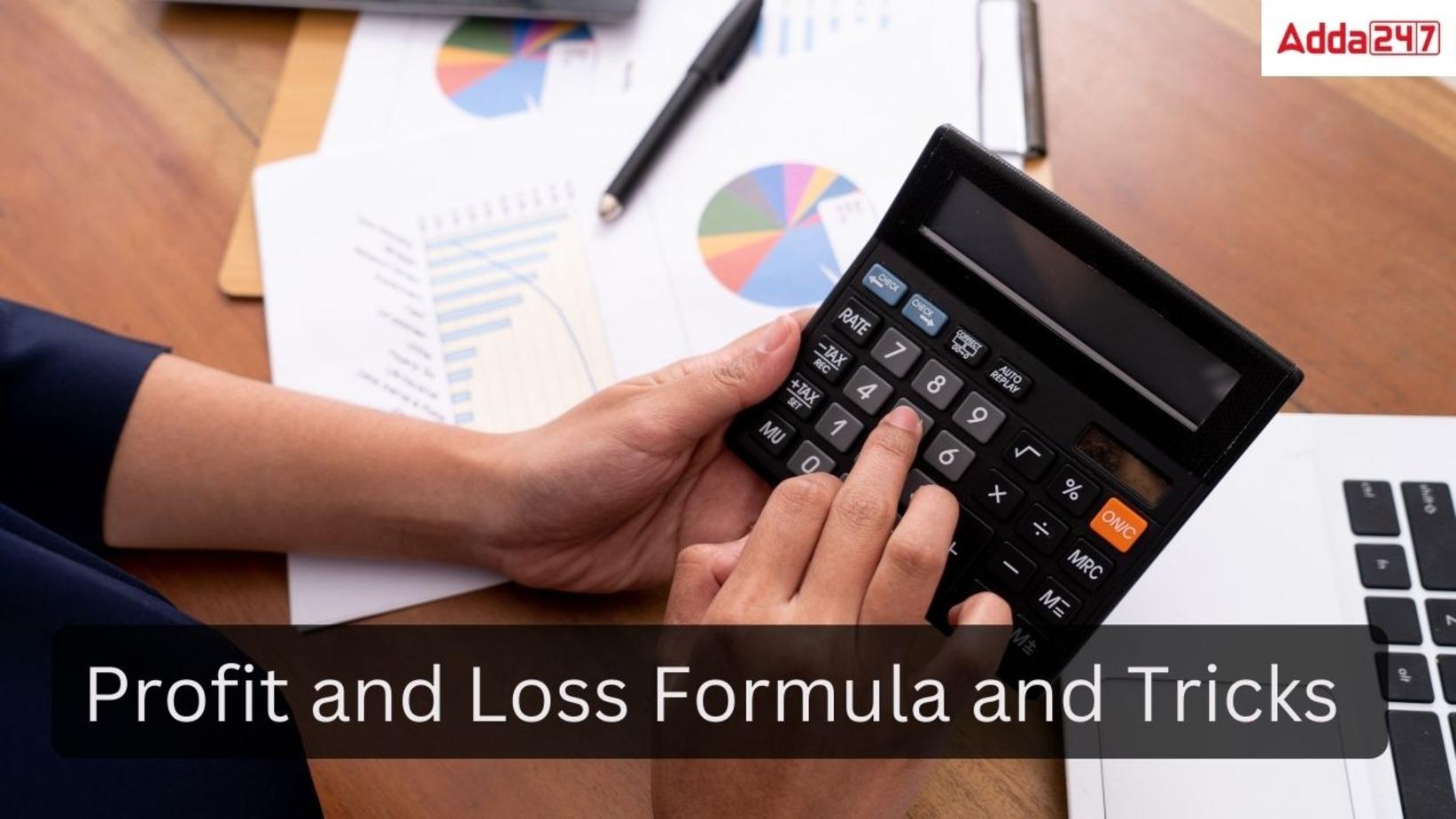Learning the profit and loss formula is one of the most important topics in mathematics. We commonly refer to a dealer’s profitability using the formula of profit and loss. Two key ideas in accounting and business are profit and loss. After subtracting all of its costs, a business’s profit is the amount of money it makes. A business’s loss is the total amount of money it loses when all of its expenses are subtracted. It is one of the most frequently asked concepts in the world of business and finance. In this article, we will learn about the profit and loss formula and tricks for profit and loss.
Profit and Loss
Profit and Loss is a fundamental concept in business and finance that deals with the relationship between the cost price and the selling price of goods or services. Here’s an overview:
- Cost Price (CP): The price at which an item is purchased or manufactured.
- Selling Price (SP): The price at which the item is sold.
- Profit: The amount gained when the selling price is greater than the cost price.
Loss: The amount lost when the selling price is less than the cost price.
Profit and Loss Formula
Profit and loss is a concept that has evolved from application areas to situations in real life that enhance us almost every day. Understanding the concepts of profit and loss is important. The concept of Profit and loss includes some special terminologies such as Cost Price, Selling price, Market Price Discount, etc. These concepts will be more clear to you after going through the questions and solved numerical given below.
Profit and Loss Formula in Maths
The importance of the formula of Profit and loss in Mathematics is very Significant. A student must Clear the concept of profit and loss. A person gets money or loses money when they purchase something for one price and then sell it for another.
Let’s use an example to help you understand. A man purchased a bicycle at Rupee 2000, which he later sold at 2400. In this case, the man gains money or profit of Rupees 400. If he sold it at 1800, now he loses money or loss of Rupees 200.
Before Learning the formula of profit and Loss, look at terms related to profit and loss.
Profit and Loss Formula Related Terms
Let’s Understand the terms related to the formula for Profit and loss one by one.
Cost Price (CP)
Cost price refers to the price paid to purchase a good or the cost to make an article and its related expenses. commodity. In short Cost, the price is Denoted as CP.
Let’s suppose the Making cost of a Notebook is 30 rupees and the Labour cost is 5 rupees per unit. The cost to transport to the bookshop is 5 rupees. Then the actual cost price of the book is 40 Rupees.
Selling price (SP)
The selling price of an item is the price at which it is purchased by a customer.
Profit (P)
Profit is the money made when a product is sold for more than what it costs to produce. Profit is always calculated on the Cost price. To gain profit, SP must be greater than the CP.
Loss(L)
A loss is defined as the sum the seller experiences after selling the good for less than its cost. It is also determined by the cost price. A loss occurs when SP is less than the CP of an article.
Marked Price (MP)
The price that the seller specifies on the product’s label is known as the marked price. The shopkeeper always gives a discount on the Marked price (MP)
Discount
Shopkeepers give discounts to customers in order to compete in the marketplace and increase sales of their products. Shopkeepers will always base any discount or offer they make on the item’s Marked price (MP)
Points to Remember
|
All Profit and Loss Formula and Percentage Formula
Profit Formula
A gain in the transaction occurs when the selling price of an item is above its cost price. Profit and profit percentage are calculated using the following formulas:
|
Profit = Selling Price – Cost Price. Profit percentage (P%) = (Profit /Cost Price) x 100 |
Loss Formula
Loss occurs in the transaction if the selling price of an item is less than the cost price. The loss and loss percentage are calculated using the following basic formulas:
|
Loss = Cost Price – Selling Price Loss percentage (L%) = (Loss / Cost price) x 100 |
Marked Price Formula
Market Price is determined by following the formula,
Marked price = Discount + Selling price
Discount Formula
As we know earlier, a Discount is always calculated on the Marked price or MRP. The formulas for determining the Discount and Discount Percentage of an article are
|
Discount = Marked Price – Selling Price Discount Percentage = (Discount/Marked price) x 100 |
Profit and Loss Formula and Tricks
Here are the key formulas and tricks for solving Profit and Loss problems. These are particularly useful in exams for quick and accurate calculations.
Key Terms
Cost Price (CP): The price at which an item is purchased.
Selling Price (SP): The price at which an item is sold.
Profit: When the Selling Price is more than the Cost Price.
Loss: When the Selling Price is less than the Cost Price.
Key Formulas
Profit (P)
Profit=SP−CP
Loss (L)
Loss=CP−SP
Profit Percentage (P%)
\text{Profit %} = \left( \frac{\text{Profit}}{\text{CP}} \right) \times 100
Loss Percentage (L%)
\text{Loss %} = \left( \frac{\text{Loss}}{\text{CP}} \right) \times 100
Selling Price (SP) with Profit %
\text{SP} = \text{CP} \times \left(1 + \frac{\text{Profit %}}{100}\right)
Selling Price (SP) with Loss %
\text{SP} = \text{CP} \times \left(1 – \frac{\text{Loss %}}{100}\right)
Cost Price (CP) with Profit %
\text{CP} = \frac{\text{SP}}{1 + \frac{\text{Profit %}}{100}}
Cost Price (CP) with Loss %
\text{CP} = \frac{\text{SP}}{1 – \frac{\text{Loss %}}{100}}
Quick Tricks
Directly Calculate SP or CP with Percentage Change:
If a problem involves an increase (Profit %), use \text{SP} = \text{CP} \times \left(1 + \frac{\text{Profit %}}{100}\right)
If a decrease (Loss %), use \text{SP} = \text{CP} \times \left(1 – \frac{\text{Loss %}}{100}\right)
Mark Price (MP) and Discount:
Marked Price is the listed price before any discount.
If there’s a discount %, new SP can be calculated as: \text{SP} = \text{MP} \times \left(1 – \frac{\text{Discount %}}{100}\right)
Successive Discount:
For two successive discounts of
𝑑1% and 𝑑2%, effective discount
D% is:
D=d1+d2 −d1×d2/100
Double Selling Price Change Trick:
If an article is sold at two different SPs and results in a profit and loss of the same percentage, then:
CP= Under root SP1×SP2
Increased/Decreased CP or SP by Percentage:
For a percentage increase in CP, the new SP needed to maintain the same profit % can be calculated accordingly by adjusting the SP using the profit percentage formula.
Profit and Loss Formula in Hindi
- लाभ सूत्र
लेन-देन में लाभ तब होता है जब किसी वस्तु का विक्रय मूल्य उसके क्रय मूल्य से अधिक होता है। लाभ और लाभ प्रतिशत की गणना निम्न फ़ॉर्मूला का उपयोग करके की जाती है:
लाभ = विक्रय मूल्य – लागत मूल्य।
लाभ प्रतिशत (पी%) = (लाभ / लागत मूल्य) x 100
- हानि सूत्र
लेन-देन में हानि तब होती है जब किसी वस्तु का विक्रय मूल्य क्रय मूल्य से कम हो। हानि और हानि प्रतिशत की गणना निम्नलिखित मूल सूत्रों का उपयोग करके की जाती है:
हानि = लागत मूल्य – विक्रय मूल्य
हानि प्रतिशत (एल%) = (हानि / लागत मूल्य) x 100
- डिस्काउंट फॉर्मूला
जैसा कि हम पहले जानते हैं, छूट की गणना हमेशा अंकित मूल्य या एमआरपी पर की जाती है। किसी लेख के छूट और छूट प्रतिशत को निर्धारित करने के सूत्र हैं
बट्टा = अंकित मूल्य – विक्रय मूल्य
छूट प्रतिशत = (छूट/चिह्नित मूल्य) x 100
Profit and Loss and Tricks for Fast Calculation
We have learned how to determine profit, loss, and their percentages by using basic formula for profit and loss. Let’s now explore some short tricks or formulas for resolving mathematical problems based on profit and loss.
- Profit = SP – CP
- Loss = CP – SP
- Profit (%) = {Profit/CP} × 100
- Loss (%) = {Loss/CP} × 100
- Discount = Marked Price – Selling Price
- Discount (%) = (Discount/MP) × 100
- SP= [(100+ Gain%)/ 100]x CP
- SP= [(100- Loss%)/ 100]x CP
- CP= [100/ (100+ Gain%)]x SP
- CP= [100/ (100- Loss%)]x SP
- The real price cost price of a product will be [100 x 100 x P/(100+m)(100+n)] if it is first sold at m% profit and then again at n% profit. CP = [100 x 100 x L/(100-m)(100-n)] in the event of a loss.
- If P% and L% are equal, then P = L and %loss = P²/100
Profit and Loss Formula Pdf
Here is a list of all important formulas for Profit and Loss in pdf format given here. Download it and Revise these formulas, So that you can able to solve the profit and loss-based questions very quickly and more efficiently. Check Profit and Loss Short Tricks PDF
Profit and Loss Statement
A profit and loss statement is a financial statement that provides an overview of the revenues, expenditures, and expenses incurred for a specific time period. These documents reveal if a business can produce a profit by raising sales, cutting expenses, or doing both. The profit and loss statements are used by investors and corporate managers to assess a company’s financial condition.
Profit and Loss Formula Questions
Here we solve some numerical problems based on the formula of profit and loss. Students can get an idea implementation of the formula of profit and loss by going through these problems.
Q.1. A Grocery shopkeeper has bought 10 kg of Rice for 400 Rupees. And sold it for Rs. 55 per kg. A customer bought 5 kg of Rice from his shop. How much is the profit gained by the shopkeeper?
Cost price for the shopkeeper per kg = 400 Rupees/ 10Kg = 40 Rs/kg.
So, the cost price of 5 kg of Rice is = (5 ×40)= 200rs.
He sold it at Rs. 55 per kg.
Hence, the Selling Price of % kg rice is =( 5 ×55)= 275 Rs.
So, the Profit earned by the shopkeeper is = ( 275 – 2000 = 75 Rs.
Q.2. A man buys a bike for Rs. 20000. But after one year, he sells it at a loss of 10%. Find out the selling price of the bike.
Solution: Cost Price of the bike is Rs.20000
He sells it at a loss of 10%.
We know that, Loss percentage = (Loss/Cost Price) x 100
Or, 10 = (Loss/20000) x 100
Or, Loss = (10 x 20000) / 100
Or, Loss= 2000 Rs.
The formula for determining loss is, Loss = Cost Price – Selling Price
Or, Selling Price = Cost Price – Loss
Or, Selling Price = 20000 – 2000 =18,000 (Answer)
Profit and Loss Formula Problems
Here we provide some numerical problems based on the formula of the profit and loss. Solving these problems based on the formula of profit and loss will help to understand the concept profit and loss in a better way.
Q.1. A shopkeeper buys a book for 500 and sells it for 550. What is the profit percentage of the shopkeeper?
Q.1. A man sells his goods at 8.33% profit on the selling price. Find actual profit %.
Q.2. The total Cost price of 16 articles is equal to the selling price of 14 articles. Find profit or loss %.
Q.3.Ayush buys a secondhand phone for Rs. 5000 and Rs. 200 for repairs. Find his gain percentage if he sells the phone for Rs. 5600.
Profit and Loss Tricks for Competitive Exams
Here are some useful aptitude tricks related to the profit and loss so that students can solve these questions in the competitive exam quickly. The following section also mentions some useful tips for solving profit and loss problems in aptitude tests or exams:
Understanding Basic Concepts: Make sure you understand the basic concepts of profit and loss, including the formulas for calculating cost price (CP), selling price (SP), profit, and loss.
Marked Price and Discount: If a discount is given on a marked price (MP), the selling price (SP) can be calculated using the formula: SP = MP – (Discount % × MP)
Successive Percentage Changes: If there are successive percentage changes (increase or decrease), you can use the formula: Final amount = Initial amount × (1 + Percentage Change/100)^n Where “n” is the number of changes.
Cost Price from Selling Price and Profit: If the selling price (SP) and the profit percentage are given, you can find the cost price (CP) using the formula: CP = SP / (1 + Profit %/100)
Loss as Percentage: If the cost price (CP) and selling price (SP) are given, the loss percentage can be calculated as: Loss % = ((CP – SP) / CP) × 100
Equivalent Profit/Loss: If there is a certain profit percentage followed by a certain loss percentage (or vice versa), you can find the equivalent overall profit or loss percentage using: Equivalent % = Profit % – Loss % – (Profit % × Loss % / 100)
Marked Price from Selling Price and Discount: If the selling price (SP) and the discount percentage are given, you can calculate the marked price (MP) using: MP = SP / (1 – Discount %/100)
Shortcut for Profit Calculation: To find the profit, subtract the cost price (CP) from the selling price (SP). To find the profit percentage, use: Profit % = (Profit / CP) × 100
Shortcut for Loss Calculation: To find the loss, subtract the selling price (SP) from the cost price (CP). To find the loss percentage, use: Loss % = (Loss / CP) × 100
Comparative Approach: When given multiple scenarios or products with varying profit/loss percentages, use comparative analysis to quickly identify the most profitable or least loss scenario.
Practice with Sample Problems: The more you practice different types of profit and loss problems, the more familiar you’ll become with the various tricks and approaches.
Remember, the key to mastering these tricks is practice. Work through a variety of problems, and over time, you’ll become more comfortable applying these techniques to solve profit and loss questions quickly and accurately.
Related Post:









 HPBOSE Compartment Date Sheet 2025 Out, ...
HPBOSE Compartment Date Sheet 2025 Out, ...
 RUHS Counselling 2025 Round 1 Seat Allot...
RUHS Counselling 2025 Round 1 Seat Allot...
 Bihar Board Dummy Registration Card 2026...
Bihar Board Dummy Registration Card 2026...










